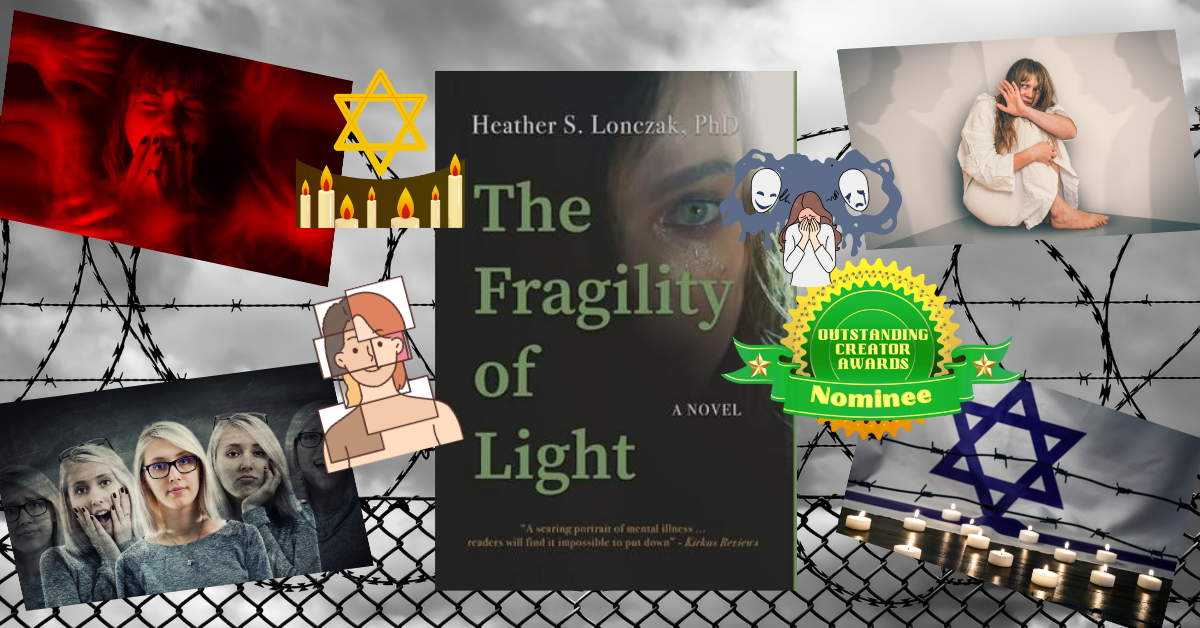|
Score: 95/100 (9.5 out of 10)
The Fragility of Light is an enthralling, fascinating, and captivating novel by Heather S. Lonczak that tackles several huge topics including generational/trans-generational trauma, grief, mental illness, romance, and healing. Initially, we were going to simplify our description of this book to what we were going to call “two big G's.” Those were: generations and grief. However, doing so would do the rest of this book a disservice. This book is about a lot more than just those two things. This book has many layers. It seems to evolve and transform as it goes along, undergoing multiple phases until these different threads come together and coalesce. Firstly, this book is a love story centered around the relationship between Sylvia Zielinski (often just called “Sunny”), a bright and beautiful girl of Jewish ancestry, and Joshua Fitzgerald, her loving husband. The beginning of this book establishes the powerful, intense, and passionate love that these two share, making it all the more tragic when things go haywire. The next phase of this book seems to focus on Sunny's ancestry and her family's history, which have profound impacts on her later on. Sunny's family endured the horrors of the Holocaust as Jews from Poland. This book goes from being a rather predictable and happy romance into a historical-fiction/pseudo-horror novel. These horrifying truths are gradually revealed to Sunny, slowly ingraining in her mind and traumatizing her. It is arguable what exactly happens to Sunny's mind (it's likely a mixture/variety of things), but these horror stories from her family likely contributed. A string of deaths in the family shatter Sunny's already-fragile mental stale, sending her into a drastic and dramatic downward spiral. And this bring us to the book's third and, arguably, most interesting phase, heavily emphasizing Sunny's mental illness. Sunny becomes incredibly paranoid and unstable, hearing voices and starting to believe that she is a Jew during the Holocaust being chased down by the Gestapo and SS to be killed and/or sent to a concentration camp. The stories of the Holocaust are not the only contributing factor's to Sunny's illness. In fact, they seem to conflate with something that's possibly hereditary: a family history of schizophrenia. The mystery of this mental illness is slowly uncovered piece by piece. Helping to construct an explanation for Sunny's illness is Peter, who reveals to the reader that Gracie suffered from very similar maladies, indicating a kind of psychosis. It's actually rather fascinating to read about! This psychosis leads to Sunny acting defensively and even violently—hitting, kicking, threatening, and even concealing weapons to, presumably, defend herself with. Her husband, Joshua, does his absolute best to understand and accommodate her. However, as Sunny becomes increasingly volatile, unstable, and even dangerous, she is admitted to a mental hospital. It is there that the experts, like Dr. Fletcher, with the help of Joshua and Peter, attempt to uncover the causes of her illness and to help her to get better. The book then enters a series of new phases, exploring Sunny in different situations with different people. Aside from working through her problems while retaining her relationship with Joshua, Sunny also forms connections with various other people like Heidi, a fellow patient at the mental institution who becomes like a best friend to her. She is also able to reconnect with Linda, someone we are told that Sunny had been unkind to in the past. Linda becomes almost like a surrogate or third mother to Sunny (after the passing of her mother and grandmother). This is a book about healing. It's also a book about understanding. People fear what they don't understand. We're quick to label people as weird, scary, or even a monster. However, it's much different when you look at things from the shoes of a person suffering from mental illness. In this book, we indeed get Sunny's perspective, which is full of delusions and confused thoughts, but delusions and thoughts that make perfect sense to her. We also get to see that she's still a good person at heart, someone who loves her husband, Joshua, and wants to make friends and connections despite the voices in her head constantly swearing at her, accusing her, and persecuting her. The final phase of this book, honestly, was the least interesting, and it seemed to drag. This book was GREAT and captivating about 75% of the time, and then it seemed like it just didn't want to end. It just kept going and going and going like the Energizer Bunny. The central conflict seemed to have already run its course. It was almost like the book had landed a knockout punch, then kept kicking the unconscious opponent a minute after the bell had rung. The subplots with Heidi and other side-characters started to become superfluous and excessive. There was a point about 300-350 pages in when we were really hoping that the author was wrapping things up, but it seemed like they just kept introducing new plot threads. However, we think we know why they were put/left in there. It's because the author probably wanted to show that your mental illness and your trauma isn't everything that you are. You aren't defined by them. They aren't YOU. YOU are YOU. Life doesn't begin and end with your mental illness or trauma, there is a life outside of that—a life afterward: one in which you can still form relationships, be married, raise a kid, have a job, and pursue a hobby (like art). We can definitely appreciate that. Check it out on Amazon!
0 Comments
Leave a Reply. |
Archives
July 2024
Categories |

 RSS Feed
RSS Feed